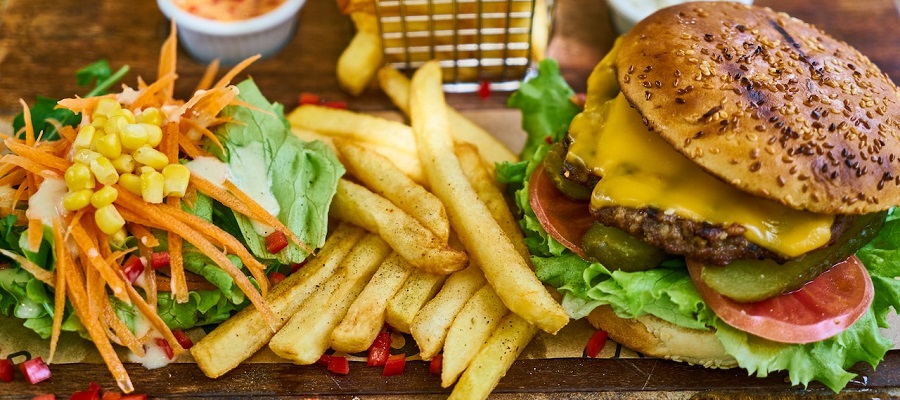There is a strong relationship between healthy eating and healthy skin. What you eat can affect the appearance and health of your skin in several ways.
Eating a healthy, balanced diet that includes a variety of fruits, vegetables, whole grains, and lean proteins can help support the overall health of your skin. These types of foods are rich in essential nutrients such as vitamins, minerals, and antioxidants, which can help protect the skin from damage and keep it looking healthy.
On the other hand, a diet high in unhealthy fats, processed foods, and sugary foods can contribute to skin problems such as acne, inflammation, and premature aging.
In addition, staying hydrated by drinking plenty of water can help keep the skin moisturized and looking healthy.
Overall, eating a healthy diet that is rich in nutrients and low in unhealthy substances can help support the health and appearance of your skin.
Most healthy meals for healthy skin
There are many healthy meals that can help support the health and appearance of your skin. Here are a few examples:
-
Salmon with roasted vegetables: Salmon is a rich source of omega-3 fatty acids, which can help reduce inflammation and protect the skin from damage. Roasting vegetables such as bell peppers, zucchini, and sweet potatoes can add flavor and nutrition to the meal.
-
Grilled chicken with quinoa and mixed greens: Grilled chicken is a lean protein source that can help support healthy skin, and quinoa is a good source of fiber and nutrients. Mixed greens such as spinach, kale, and arugula are rich in vitamins and minerals that can help support healthy skin.
-
Lentil soup with whole grain bread: Lentils are a good source of protein and fiber, and they also contain antioxidants that can help protect the skin from damage. Serving the soup with whole-grain bread can add additional fiber and nutrients to the meal.
-
Grilled tofu with brown rice and steamed broccoli: Tofu is a plant-based protein source that is rich in nutrients such as zinc and selenium, which can support healthy skin. Brown rice is a good source of complex carbohydrates and nutrients, and steamed broccoli is rich in vitamins and minerals that can help support healthy skin.
Remember to also drink plenty of water to stay hydrated and support healthy skin.
What should we avoid eating to get healthy skin?
There are certain types of foods that may not be as beneficial for the health and appearance of your skin. Here are a few examples of foods that you may want to limit or avoid in order to support healthy skin:
-
Processed foods: Processed foods are often high in added sugars, unhealthy fats, and artificial ingredients, which can contribute to skin problems such as acne, inflammation, and premature aging.
-
Refined grains: Refined grains, such as white bread and pasta, are stripped of their outer layers during processing, which removes many of the nutrients that can support healthy skin.
-
High-fat dairy products: Some high-fat dairy products, such as whole milk and full-fat cheese, can contribute to acne and other skin problems.
-
Fried foods: Fried foods are high in unhealthy fats and can contribute to inflammation and other skin problems.
-
Alcohol: Excessive alcohol consumption can lead to dehydration and contribute to skin problems such as acne and inflammation.
It is important to remember that no one food is solely responsible for the health of your skin, and it is important to focus on overall diet and lifestyle factors in order to support healthy skin. If you are concerned about your skin health, it is a good idea to talk to a healthcare professional or a registered dietitian for personalized advice.
Examples of both types of good and bad meals
Here are a few examples of healthy meals that can support the health and appearance of your skin:
-
Grilled chicken with quinoa and mixed greens: Grilled chicken is a lean protein source that can help support healthy skin, and quinoa is a good source of fiber and nutrients. Mixed greens such as spinach, kale, and arugula are rich in vitamins and minerals that can help support healthy skin.
-
Lentil soup with whole grain bread: Lentils are a good source of protein and fiber, and they also contain antioxidants that can help protect the skin from damage. Serving the soup with whole grain bread can add additional fiber and nutrients to the meal.
-
Grilled tofu with brown rice and steamed broccoli: Tofu is a plant-based protein source that is rich in nutrients such as zinc and selenium, which can support healthy skin. Brown rice is a good source of complex carbohydrates and nutrients, and steamed broccoli is rich in vitamins and minerals that can help support healthy skin.
Here are a few examples of unhealthy meals that may not be as beneficial for the health and appearance of your skin:
-
Fast food burger and fries: Fast food burgers and fries are often high in unhealthy fats, sodium, and artificial ingredients, which can contribute to skin problems such as acne, inflammation, and premature aging.
-
White bread sandwich with processed deli meat and cheese: White bread is a refined grain that is low in nutrients, and processed deli meat and cheese can be high in sodium and unhealthy fats.
-
Ice cream sundae with whipped cream and chocolate sauce: Ice cream is high in added sugars and unhealthy fats, and the whipped cream and chocolate sauce can add additional sugar and unhealthy fats to the meal.
It is important to remember that no one food is solely responsible for the health of your skin, and it is important to focus on overall diet and lifestyle factors in order to support healthy skin. If you are concerned about your skin health, it is a good idea to talk to a healthcare professional or a registered dietitian for personalized advice.


